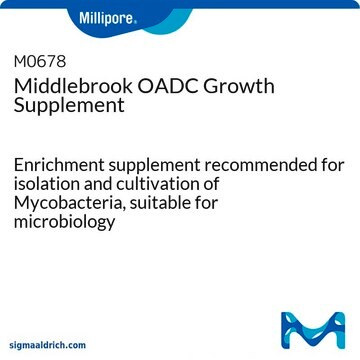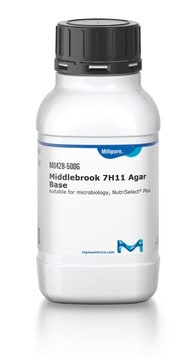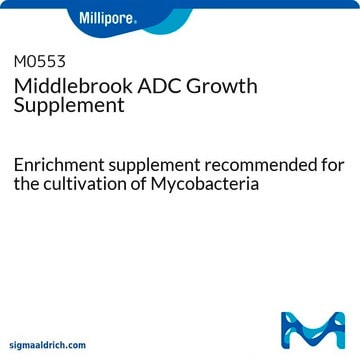M0303
Middlebrook 7H10 Agar Base
suitable for microbiology, NutriSelect® Plus, for use in isolation and cultivation of Mycobacterium species
Synonym(s):
Mycobacterial culture media
About This Item
Recommended Products
Quality Level
sterility
non-sterile
product line
BioChemika
form
powder
shelf life
limited shelf life, expiry date on the label
packaging
pkg of 500 g
manufacturer/tradename
NutriSelect® Plus
technique(s)
microbe id | susceptibility testing: suitable
microbiological culture: suitable
final pH
6.6±0.2 (25 °C)
application(s)
clinical testing
food and beverages
life science and biopharma
veterinary
microbiology
suitability
mycobacteria
Related Categories
General description
Application
Components
Ammonium sulfate, 0.50
L-Glutamic acid, 0.50
Monopotassium phosphate, 1.50
Disodium phosphate, 1.50
Sodium citrate, 0.40
Ferric ammonium citrate, 0.04
Magnesium sulfate, 0.025
Calcium chloride, 0.0005
Zinc sulfate, 0.001
Copper sulfate, 0.001
Pyridoxine hydrochloride, 0.001
Biotin, 0.0005
Malachite green, 0.00025
Agar, 15.00
Preparation Note
Footnote
The designations basic, plus, or prime are added to indicate the quality control level, from basic quality control to standard QC plus to prime for full regulatory compliance.
Legal Information
related product
Storage Class
11 - Combustible Solids
wgk_germany
WGK 2
flash_point_f
Not applicable
flash_point_c
Not applicable
Choose from one of the most recent versions:
Already Own This Product?
Find documentation for the products that you have recently purchased in the Document Library.
Customers Also Viewed
Articles
Identifying Mycobacterium species crucial due to varying clinical significance; some pathogenic, others not.
Our team of scientists has experience in all areas of research including Life Science, Material Science, Chemical Synthesis, Chromatography, Analytical and many others.
Contact Technical Service














